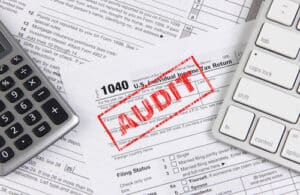- Home
- THE FIRM+
- Criminal Defense+
- CASE RESULTS
- AREAS WE SERVE+
- FAQ’s
- Blog
- Contact
Tax Fraud Defense Lawyers
A Federal Criminal Defense Attorney With Experience Fighting Illinois Tax Fraud Charges
At Azhari LLC, we defend individuals and businesses accused of federal tax fraud in Chicago. With years of criminal defense experience as tax fraud lawyers, we know the federal and state tax laws. We will protect your rights and provide the aggressive defense you need when faced with IRS audits or tax criminal charges.
What is Tax Fraud?
Tax fraud occurs when an individual or business intentionally falsifies information on tax returns to reduce its tax liability. This can include underreporting income, inflating deductions, or not filing at all. The penalties for tax fraud are severe, often resulting in big fines, interest, and potential prison time. Knowing the types of federal tax fraud and the consequences is important for a good defense.
In the United States, all individuals and businesses are required to file an annual tax return with the Internal Revenue Service, which specifies income made for the year that is subject to tax liability. However, not all taxpayers play by the rules and decide to alter their tax returns in hopes of defrauding the government. Federal tax fraud or evasion is committed by an individual or business who willfully and intentionally lies or fabricates the information on their tax return in order to reduce the amount of money that will be subject to tax liability.
Some common examples of behavior that may be considered tax fraud or evasion include:
- Claiming false deductions that you, in fact, are not entitled to,
- Not reporting income earned by yourself or a corporation in order to pocket more money, also known as underreporting income,
- Inappropriately claiming expenses as business when they are personal,
- Concealing assets,
- Filing a false return that is not yours,
- Not filing a tax return, among many others.
While tax fraud or evasion can be committed in several ways, the distinguishing feature of tax fraud is the wrongdoer’s intention to defraud the government. Proving tax fraud or evasion can be difficult for the government because the government has the burden of proof to show that the taxpayer knowingly violated the tax code when they failed to report or chose to omit specific information. However, even if the failure to report is a careless mistake, it can add a hefty penalty to your tax bill.
Who Can Be Accused of Committing Tax Evasion and Federal Tax Fraud?
Tax evasion or fraud is committed by the rich and famous and the everyday person trying to get by. National headlines have been made by several celebrities who have attempted to evade taxes and have since had to pay the government back. In Illinois, former Democratic Representative Jesse Jackson Jr. was charged with fraudulently obtaining three-quarters of a million dollars of funds from his campaign. In contrast, his wife was charged with covering up the receipt of funds. Wesley Snipes was charged with failing to file a tax return for three consecutive years, adding up to 7 million dollars, while Willie Nelson was fined more than $16 million in back taxes.
While the demographic does vary, the most common group of individuals who evade or defraud taxes include business owners or those who are self-employed in a cash-based business. Some of the most common employees known to intentionally evade or defraud the government include accountants, doctors, lawyers, mechanics, and those in the service industry. Thus, while an individual may think they can go undetected if the government starts to suspect something, they will conduct an investigation, no matter your occupation.
What Are The Penalties For Federal Tax Fraud Crimes in Illinois?
When the Internal Revenue Service suspects tax evasion or fraud has occurred, it investigates its Criminal Investigation Unit. If they find that you have evaded or fraudulently filed taxes, you will be punished and penalized under Title 26 of the Internal Revenue Code and Title 18 of the United States Code. According to the Internal Revenue Service, of the nearly 1200 cases that have been initiated, roughly 770 have been sentenced, with an incarceration rate of 76%, meaning that if found guilty and handed down a sentence, there is an overwhelming chance that the wrongdoer will either serve time in federal prison, halfway home, on home arrest or any combination thereof.
Conviction under Title 18 of the United States Code can result in criminal penalties such as imprisonment of up to 5 years or fines of up to $250,000, depending on the conviction. 18 USC 371. Title 26 of the Internal Revenue Code contains a number of titles under which an individual or corporation may be prosecuted, including:
- Attempt to evade or defeat tax, Section 7201;
- Willful failure to collect or pay over tax, Section 7202;
- Willful failure to file the return, supply information, or pay tax, Section 7203;
- Providing false statements or fraud, Section 7206(2); and
- Attempts to interfere with administration of IRS, section 7212(A).
Dealing with the IRS?
Handling tax-related matters with the IRS can be a complex situation that requires the assistance of a seasoned professional. If you or someone you know needs assistance with their tax issue, we can discuss it today. Do not hesitate to contact the Offices of Sami Azhari, LLC, any time, day or night, weekday or weekend, to discuss your claim.
Azhari LLC’s Experience
Azhari LLC has defended clients accused of tax fraud. We know Illinois tax laws and federal tax laws. We have handled complex tax fraud cases, from IRS audits to full criminal trials. We can navigate the legal system, negotiate with IRS agents, and challenge evidence to give you the best defense.
How We Defend
Our defense strategies are case specific. Common approaches are:
- Showing that any tax discrepancies were innocent.
- Proving you were not willfully involved in the fraud.
- Challenging the IRS’s evidence and how they got the information. We work hard to find weaknesses in the prosecution’s case and negotiate with the IRS or state to reduce or drop charges.
Why Choose Azhari LLC for Federal Tax Fraud Defense in Chicago?
Azhari LLC has an advantage in tax fraud cases in Chicago:
- Local: We know the Chicago courts, tax laws, and IRS procedures.
- Experience: We have handled many tax fraud cases and gotten good results for our clients.
- Personal: We know every tax fraud case is different. We give you a custom defense.
Call Sami at (312) 626 – 2871 or (847) 255 – 2100. No commitment is required, and the consultation is always free.

























































